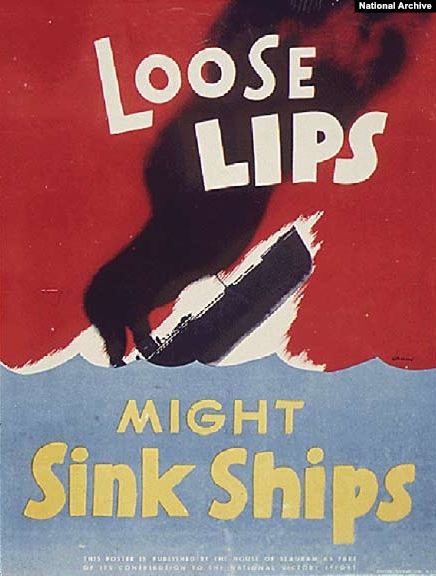پادکست VOA: اصطلاحات انگلیسی – دهن لقی
سلام با چهل و ششمین قسمت از مجموعه “Words and Their Stories” (کلمات و داستان آن ها) از سری پادکستهای VOA در خدمت شما هستیم. این مجموعه پادکست به توضیح اصطلاحات رایج زبان انگلیسی، داستان ایجاد شدنشون و نحوه استفاده از آن ها در مکالمه می پردازه. در این قسمت از پادکست VOA: اصطلاحات انگلیسی – دهن لقی قراره با معنی، کاربرد و تاریخچه ی اصطلاح “Loose lips sink ships” (دهان لق کشتی ها را غرق میکند!) آشنابشی. در کنارش چندین اصطلاح و کلمه ی جالب و کاربردی دیگه هم یاد میگیری که لیست این کلمه ها به همراه معنی اون ها در پایان مطلب قرار گرفته.
اصطلاح “Loose lips sink ships” (دهان لق کشتی ها را غرق میکند!) برای هشدار دادن درمورد خطر دهن لقی به کار میره. مثلا اگه داری رو یه پروژه کار میکنی و یه نفر از اعضای گروه قبل از رونمایی پروژه اون رو لو بده ممکنه پروژه با شکست رو به رو شه!
VOA – Words and Their Stories – 46: Loose lips sink ships

متن انگلیسی پادکست VOA اصطلاحات انگلیسی – دهن لقی :
Hi there and welcome to this week’s Words and Their Stories!
On today’s show we will talk about an idiom of warning. And it is not very easy to say: Loose lips sink ships.
This idiom began during World War II as a slogan used by the United States Office of War Information. It was part of a propaganda campaign. So, the slogan “loose lips sink ships” was printed on posters and hung in many public places, such as schools and churches.
This wartime expression warned people in the military as well as ordinary citizens to watch what they say. Unguarded talk may give useful information to the enemy.
Part of the propaganda campaign warned that simply revealing the location of a loved one on a ship could be dangerous. That information could be passed on to the enemy or to a spy. The posters show in detail a ship being attacked and soldiers being killed.
This idiom still may not make sense to you. So, let’s break it down. Something “loose” moves easily. So, loose lips move freely and release a lot of words — most likely in a careless way. If you speak carelessly (that’s the “loose lips” part) about private or sensitive information, someone could hear and use it to damage or ruin something important (a “sinking ship” is pretty bad).
The message: Be careful when you speak. Watch what you say. Beware of spies. And during war, you never know who is a spy. That is the nature of spying.

One of the most famous – or maybe I should say infamous – spies in history was the Dutch dancer Mata Hari. Well, Mata Hari was the name she used when she performed as a dancer in Paris in the early 1900s.
The online Encyclopedia Britannica explains that Mata Hari was romantically linked to a number of men. Many of them were military officers around the time of World War I. Both Germany and France must have believed some of those officers would have loose lips around this beautiful woman, because the two countries sought to get secret information from her.
But when French officials suspected she was spying for Germany, they arrested her. She was tried and found guilty of supplying Germany with information. She was shot by firing squad on October 15, 1917.
It is unlikely that Mata Hari was responsible for sinking any ships. And she may not have been a spy. Some documents reportedly prove her innocence. Although her relatives may find that evidence to be cold comfort — after all, her reputation remains damaged. We still use the name “Mata Hari” to describe a devious woman who uses her sexual appeal to get men to spill their secrets.
Now, let’s go back to loose lips sinking ships. Keep in mind that you do not have to be in the middle of a war to use that idiom.
For example, let’s say you are working on a project at work with a small team of people. Until you are ready to launch the secret product it is best that no one else knows. So, you can warn your teammates that “loose lips sink ships.” If they want the project to be successful, they should keep the details to themselves.
And that’s the end of this Words and Their Stories. Until next time … I’m Anna Matteo.Be careful what you say,Loose talk could sink this shipWell the way that I am, I was weak as a lamb,See it on my shaky lip
Anna Matteo and Kelly Jean Kelly wrote this story for VOA Learning English. Kelly Jean Kelly was the editor. The song at the end is Spandau Ballet singing “Swept.”
لیست واژگان این پادکست
idiom (اصطلاح) – n. an expression that cannot be understood from the meanings of its separate words but that has a separate meaning of its own
slogan (شعار)– n. a brief attention-getting phrase used in advertising or promotion
propaganda (تبلیغات/پروپاگاندا) – n. an organized spreading of ideas
synonym (مترادف) – n. a word that has the same meaning as another word in the same language
treason (خیانت) – n. the crime of trying to overthrow your country’s government or of helping your country’s enemies during war : treasonous (خیانت کارانه) – adj.
cold comfort (دلگرمی ناکافی) – n. quite limited sympathy, consolation, or encouragement
reputation (شهرت) – n. the common opinion that people have about someone or something : the way in which people think of someone or something
devious (شرورانه) – adj. willing to lie and trick people in order to get what is wanted
spill (لو دادن) – v. to tell secret or hidden information
امیدوارم از پادکست VOA: اصطلاحات انگلیسی – دهن لقی لذت برده باشید. برای دسترسی به قسمت های دیگر این پادکست می توانید از صفحه ی پادکست VOA – اصطلاحات انگلیسی آکادمی مجازی آموزش زبان ۲۴talk دیدن کنید.
همچنین برای گوش دادن به پادکست های سطح بندی شده British Council می توانید به صفحه ی پادکست British Council آکادمی مجازی آموزش زبان ۲۴talk یا برای گوش دادن به پادکست های BBC به صفحه ی پادکست ۶ دقیقه انگلیسی (BBC) آکادمی مجازی آموزش زبان ۲۴talk مراجعه کنید.
گوش دادن به پادکست روش خوبی برای تقویت مهارت شنیداری و هم چنین یادگرفتن کلمات در بستر یک موضوع خاصه که این به تقویت مهارت مکالمه انگلیسی نیز کمک زیادی می کنه.
اگه دنبال این هستی که مهارت های مکالمه زبان انگلیسیت رو بیشتر از این تقویت کنی بهت پیشنهاد میکنم در دورهی مکالمه زبان انگلیسی آکادمی مجازی آموزش زبان انگلیسی ۲۴talk شرکت کنی که با یه برنامه منسجم و خلاقانه کمک میکنه در زمان کوتاه بتونی به راحتی و روانی انگلیسی صحبت کنی.







